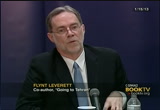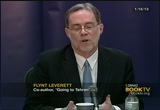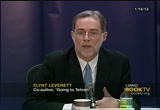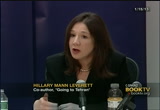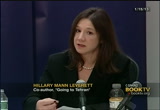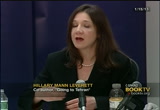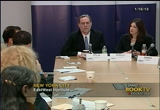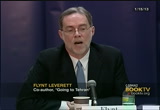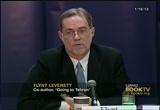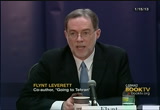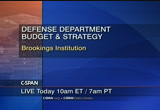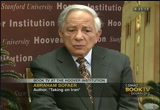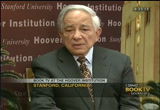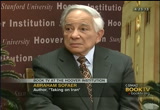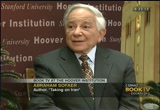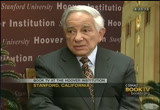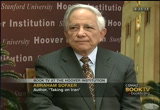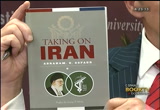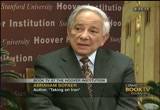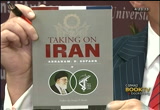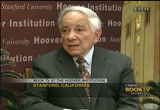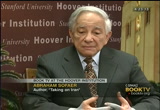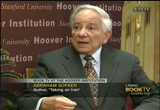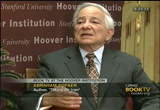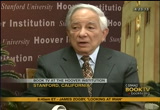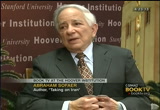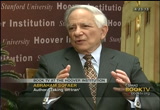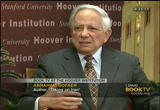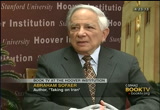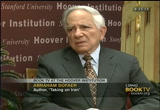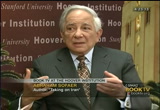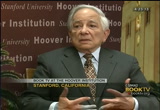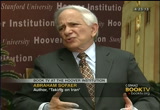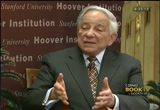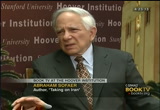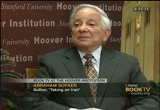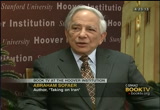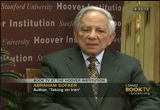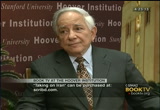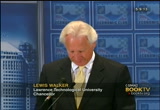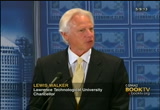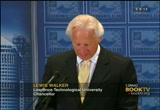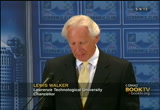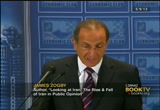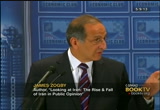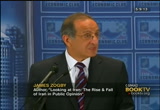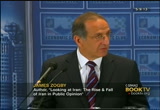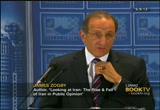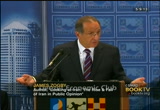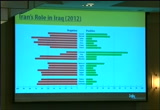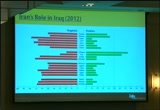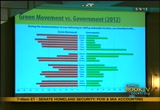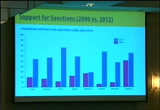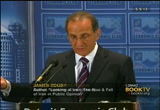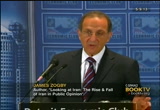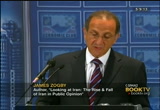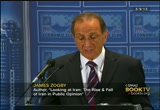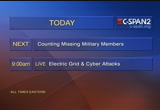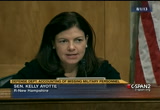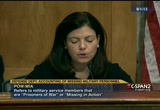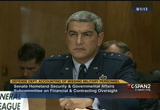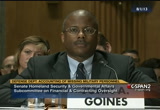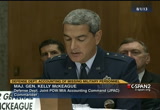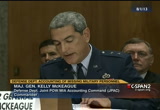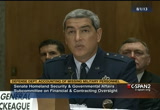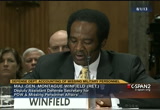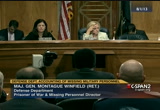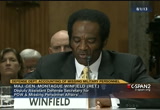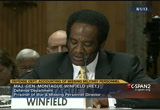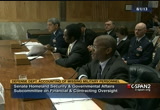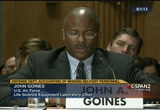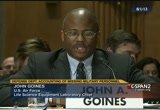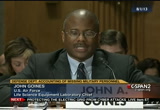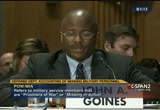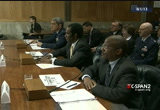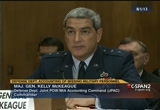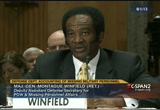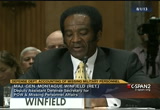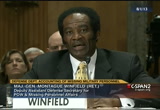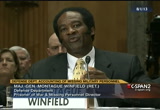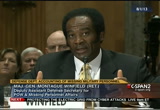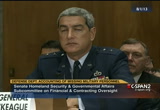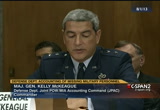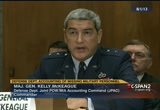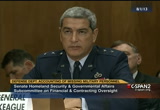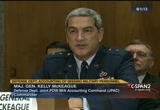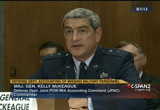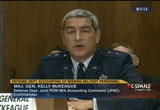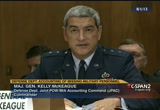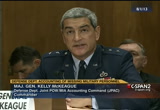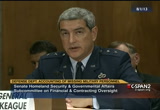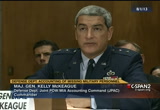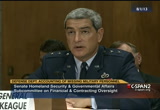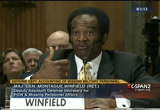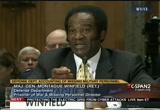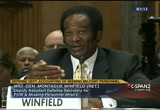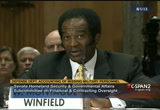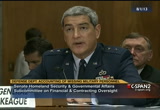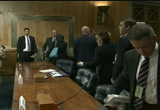tv Today in Washington CSPAN August 6, 2013 6:00am-9:01am EDT
6:59 am
7:00 am
the big winner. because iraq was defeated, saddam hussein was the biggest nemesis to iran was defeated, and iran was now emboldened in their broader region. it goes beyond that though. they see iran's role in bahrain, which some think here in the west is just a matter of saudi propaganda but arab public opinion thinks iran is involved. whether it is or not the perception -- mom tells me this all done. she says it doesn't matter, people think you are doing something. take a look at what you're doing. it doesn't matter whether not it's real or not. public opinion believes it is real. and the nail in the coffin in arab public opinion for iran is series. 17 of the 20 countries that we have surveyed now believe that iran's role in iraq, and syria is decidedly negative and it is
7:01 am
a big factor in their judgment of iran. so there was a gap at one point between arab a look opinion and arab leadership. arab leadership opposed iran. arab public opinion support iran. that gap has now been erased. is something that whether one likes it or not like you said about messaging, you have to pay attention to that because it matters. it matters not people will behave. understand how i'm going to give you a for instance, from my work here in the states. i call this the fair contractor. back in 84 i was jesse jackson's deputy campaign manager, and reverend jackson would be moving up and doing some things that require interesting and opening new possibilities for african-american leadership in politics. then all of a sudden louis farrakhan comes in make some outrageous. he would make an outrageous, and you get the groups saying he
7:02 am
must be denounced, he must be this, and you can't, whatever. reverend jackson was in a bind because they wanted him to denounce the senator's words of people in the press, and he would say i'm not going to turn against my community. i'm not going to get in a fight. but why is farrakhan doing this? at one point ron walters who at the time that an african-american studies at howard university and went on to university of maryland and has passed away a few years ago, unfortunately was referred to as leading analyst of black politics. i think ron was the leading analyst of american politics but he was tight cast and was unfortunate because he never got direct nation deserved. i said, ron, what is going on? ron said, reverend farrakhan understands the gap that exists between black and white perceptions. and he is the measure of the alienation of black america from white america.
7:03 am
so he knows. if he is outrageous and people attack him, there will be a tendency to support him. because he is now being deleted by the very people who are being viewed as the people who are oppressing. he would make these outrageous comments, he would be attacked and they would come into town without advertising a draw 20,000 people to a rally because people were rallying around the attacked brother. it's much the same in the arab world. when saddam hussein was making bold and outrageous comments, he was praying on the alienation and the frustration and anger of people who feel that their history is out of control, that they are being beleaguered by the west, that they have no ability to shape their destiny. and so here's this guy standing up and defending them. james baker understood that.
7:04 am
in 1991, he spoke before congressional testimony and said why don't we do this? why don't we do that? james baker said understand, what saddam is doing is praying on arab alienation. we have to recognize that and work to win public opinion over. he understood. george bush unfortunately never did. and so what happened was when israel attacked gaza come when israel attacked lebanon, when the u.s. committed is outrageous and iraq we lost heir of public opinion and we had this little guy in tehran becoming the new hero of the arab masses, saying to them come your governments are doing nothing. i'm the one standing up against the west. in 2006, his numbers were way it. iran's numbers rose as arab alienation and frustration with the west group and as the ability or the willingness of their own leaders to challenge
7:05 am
the west became obvious, they went down and aquatint shot went up. they became the resistance that was fighting for air of honor and everyone arab honor was viewed after abu ghraib, you know, it's tough. we don't want remember on the great. we forget it. arabs don't. we don't want to think about what the iraq war meant all those years, or what the continued situation of palestinians, or of lebanon beleaguered after all these years and continually under threat were occupied for 20 years. we don't want to think about that. but the arab world does. it is their history out of control. and so when iran was riding high, the arab world turned to which. but at this point, president
7:06 am
obama has had many failures, admittedly. many areas of things he tried to do that didn't get done. couldn't close guantánamo. senate wouldn't let them. couldn't a number things, but ht you lowered america's provost. the very thing he gets criticized for in the republican party, and you're generally, is the leading from behind concept. the reverend -- but you will, in the focus groups we did after we did the polling we asked them what the best thing about america was right now, they said leading from behind. they use that expression but they like leader that respects and put you out in front. that is confident enough to not have to take the lead, or for whatever reason. decides i'm not going to be bellicose, i'm not going to be the you are with me or against me, or the wanted dead or alive cowboy mindset. that's earning points, interestingly enough. and so america lowers its profile.
7:07 am
iran is now seen morbidly through its own behavior, rather than through the lens of the american people. when iran is viewed through the lens of american behavior, it wins. when iran is viewed as the lens of its own behavior, it loses. there's another factor, and we loowewill look at that in a min, that's the role of turkey. if they were still looking for a hero, in 2006, the president of turkey, the prime minister of turkey, rather, goes to recession in top of switzerland where he sat with the president of israel. israel had just finished devastating gaza, and prime minister erdogan challenge the president of israel, gaza angry at them, he stormed off the stage in a great dramatic gesture, and people sit in wesco what is he doing? what he was doing was building up big points in the arab world.
7:08 am
he was standing up for on. that's how they did it. and turkeys numbers went way up, as the same time the iranians were beginning now to dip. shortly after that they began to dip. and so you'll see, i was sure this lebanon, iran's number stuck on this way since 2006 and turkey's numbers have gone this way since 2006. now, there are some policy implications to all of this. let me close on that. the u.s. has experienced slight improvement in its favor writing. that's true. and the us is viewed more positively today in the region in terms of its contribution to stability. it's not viewed as a wildcard they can't, but you don't know what they're going to do next. but we are in a very dangerous
7:09 am
era, in the midst of this arab spring, because arab and muslim public opinion are now in great flocks. insensitivities remain high. interestingly enough, the region is more volatile than it has ever been before, precisely because new governments that have, into office after arab spring, and old government the remain in office since air of spring are not sensitive to arab voices but when i wrote my book, "arab voices," and i said the matter, i'm in the matter to america. after arab spring, arab voices matter to arab leaders. they have to know what the people are thinking and pay attention to what they are thinking. and so what is clear right now is that there's a lesson for everybody in the current situation. first there's a lesson for iran. iran needs to understand its current isolation. it needs to understand that it is -- that its position is precarious and it is precarious and cannot overplay s hand. in the past, it's defined
7:10 am
behavior, it's aggressive behavior won support from an appreciative original audience. now it is seen as threatening and unsettling. there's a lesson for governments in the region. they have to address the domestic concern and develop policies that rein in extremists groups that are fueling sectarian discontent and alienation in their own country. this is greeting fertile ground, not only for extremists but fertile ground for iran to exploit. the situation in bahrain is ripe for export ocean is not that iranians created. it is ripe for exploitation a majority committee is denied rights. and other countries as well have to pay attention to the situation that is taking place, and of the extremist groups that are going further to fuel this sectarian animosity. israel has to be reined in.
7:11 am
it's long been the of palestinian rights remains a serious problem to a serious problem that cuts to the click of the arab soul. the palestinian situation today is we guess it but it will not be quiescent for ever and should the palestinian situation explode with renewed violence and the repression, and if you should again side with israel as is expected, it would inflame regional passions and open a door that iran has close on itself. it's also more to recognize in the situation that new governments in arab spring countries are less able to control angry protests than you were in the past. resident the work was able to squash everything that came down the road. new governments in the region cannot do that as they had before. and so they are more sensitive to public opinion because they have to be sensitive to public opinion because they are more vulnerable. the u.s. at the same time as a lesson to learn from that is that there are benefits accrued
7:12 am
from a lower profile and an effort to work with allies from bidding from behind. should just change course, and either resume a belligerent posture or take unsupported popular unilateral military action against iran, this would only serve to refocus the region's attention away from iran and back on the west. that is something america doesn't need. and, finally, for all parties, bellicose suggestions of military actions are absolute wrong headed. this applies to the u.s., it applies to israel, it applies to iran. they only exacerbate tensions and even regional divides them play in a very hands of those who have repeatedly demonstrated the ability to turn threats or an actual attack should it come to that indeed and increase support for iran. take a look at some of the numbers. i want to show you some of the
7:13 am
slides here as we go forward. this is iran's rating in six countries that we pull annually. from 2006-2011. you can see the steady drop everywhere. in lebanon the numbers are because of the sectarian divide and because of other factors that i'll talk about about lebanon in just a minute. in 2012 the numbers climbed up a bit for iran. and one of the reasons why, and usher is in this light and also in the turkey site, one of the reasonable is because of the sectarian issue. in other words, in saudi arabia the numbers went up because the shia population in saudi arabia began stronger sports of iran, while the sunni population remained negative. iran's role in the region, positive or negative? iran's role in iraq, positive or negative? only in lebanon and iraq is viewed positively. almost everywhere else
7:14 am
negatively. a note about lebanon. lebanon is a fascinating country in this regard. while the rest of the regencies iran through the lens of its behavior elsewhere, in lebanon they see iran through the behavior of israel still and they see it through the lens of 2006. in focus groups we did, we did this poll three different times in the last two years and we asked the questions over again. i said i have to do it again. we did it again. we did it again. and then we did focus groups. is what we heard. after 2006 the only country that stood by us was iran. the only one who invested and they did just invest in the south, they invested in all the country. america did nothing for us. in lebanon there's a deep division on issues of serious. there is a deep division on issue of hezbollah's. there's a deep division on the election of the next government. there's no division on iran. iran gets a pass in lebanon
7:15 am
right now, and it's just fascinating. iraq obviously is in a different situation because it's a majority population that iran has worked hard to cultivate and help overcome some of the wounds of the long iran-iraq war. for a country that claimed to be the defenders of the resistance and of the popular will and of the popular muslim whatever, whatever, whatever, the green movement to a real toll. again, iran gets a pass. it gets a pass in lebanon but it gets a pass and iraq. interesting gets a pass in yemen which also has a large shia population and iran has been heavily involved in the country. it gets a pass in kind of revolution in algeria and libya. let in all the other 15 countries it gets decidedly negative ratings. iran's role in bahrain, again, lebanon, not a word of criticism. iraq, very little criticism.
7:16 am
every other country negative. turkey's favorable rating. this is again the sectarian issue. look at turkey's numbers going from 2002 to where they are today. in 2011 there was a peak. but look in 2012 where you have a sectarian divide. what you have is the issue of the shia population turning against turkey and, therefore, driving the numbers down. now, iran's, does iran have nuclear ambition? the purple, 2006, that's the people sit back and. doesn't want to produce a nuclear weapon? very low. in 2012 its increased. do you support sanctions against iran? to stop its nuclear program? in all those countries, with the exception of morocco you have majorities saying yes. sanctions today. look at the numbers back then. only turkey was hot back in 2006.
7:17 am
but look, if you ask about military support, support from the to actions the numbers remained decidedly low. they've increased somewhat but still very low. majorities in all those countries said no military strike. any other countries we didn't poll in both years the numbers are even higher, a post. here's that worrisome sectarian divide that has opened up. favorable attitudes towards iran in every country except for yemen. you have a deep division. oman is also like that, and to some extent the uae has less of a sectarian divide. but in other countries the issue of saudi arabia and bahrain for example, it is clearly huge black red state blue state here in america on this issue. and this one, what mitigates against the divide is the unity that exists in both countries on culture. we ask just one question.
7:18 am
we asked the hostess of questions about arab culture versus persian culture versus arab contributions to civilization versus purses -- persian conservation service and. and iran they do to their culture superior. in turkey a few to their culture over the moon superior. in the arab world there is that sense of arab culture trumps my political differences with iran, or buy political support. so even among sunni and shia both you get very strong attitudes of arab culture being superior. and that's were i was up until take any questions you might have. thank you. [applause] >> we have received many questions, and also many questions, many very good
7:19 am
questions from our students. and i'm going to try to summarize some of these, lump-sum together a particular topic. and the first one has to do with the upcoming election and iran. i think it's about five weeks. and what do we see us likely happening there, will that likely lead some softening of iran and some of their positions on nuclear and other issues? there's a comment about, many people seem to be saying, and the candidates are emphasizing mismanagement of the economy by the government, rather than seeing that as an effect of the sanctions. do we really need to worry about what they feel is an over emphasis on the nationalization issue? >> number one, i have no idea how the iranian elections were. i don't think any of us to at
7:20 am
this point in time because we don't know what the candidates are going to look like. we have a sense of where the trends are, the tendencies are. there will be a moderate reformer probably. there will be a hardliner from the religious side, and the current president wants a hardliner from one of his allies to run. that being said, i don't expect a significant change in iranian policy on any of these questions that affect the outside world. i mean, iran's policy has been rather consistent from the days of the shah. in that sense of iran seeking to put a more dominant role in the gulf region, by any means necessary, that's been a consistent feature of iranian policy. that's not going to change. what will change is the caricature of the president of iran. i mean, and president presidentf ahmadinejad has been an easy target for the west. and i don't think we'll get
7:21 am
somebody like that. those who represent his tendency and those represent an even more hardline the tenets he are more civil appearance, independence they are more civil characters and have a more distinguished way of presenting themselves. that was precisely what made him attractive and popular as the mayor of tehran him and his ability to mobilize popular support. i think that, again, the degree to which we make this issue, us and israel versus iran, is a huge mistake. it plays right into the hands of the hardest line attitudes in that country. and don't do us any good at all. it's almost like asking for trouble. if somebody doesn't like you, and certainly doesn't like your best ally, making that you don't like them, and you know that they don't like you, that's not ust reinforcing bad
7:22 am
attitudes. the point is, a more hands-off attitude towards iran's right now, keep the sanctions in place, if you will, there's popular support in the arab world for the sanctions. but the rhetoric and the threats simply don't pay. i tell israel to go its jets and lived alone. because at the end of the day i don't think iran threatens israel. i think the rhetoric of iran threatens israel but iran does not pose a threat to israel. just like i think israel is going to do anything about iran. i think the leader in israel italy and iran need each other and play off each other. because it's kind of good for domestic politics. it's really good for president in five to say, you know, we're going to do this -- president ahmadinejad. it's like the playground as far apart from each other. they have no ability took office waning attention to accomplish because both of them know that if they do what it will open as we say the gates of hell.
7:23 am
i remember during the 84 convention there was some of us who are proposing resolution calling for a ban on first use, first use of nuclear weapons your some of you all said there is no first use, no second is. because you use and there is five seconds late and jordan. it's sort of like walking down the street and you come into a dark alley and george foreman is walking the other way. and you say to yourself, should i hit him first or should i wait? it's like it doesn't matter, hitting first and your debt five seconds late. take your choice. best to go around and go the other way. the point is there is no use. i would say the best attitude towards iran's nuclear program only should been ridiculed. it's okay, what i going to do with it, you did? are you going to feature people with the? he wants it for bragging rights. iran's target has never been israel. its target of us been arab public opinion. from the beginning it has been a
7:24 am
challenge to the air people, your leaders don't represent real islam. your leaders don't represent a challenge to the west that we do. we are the defined once. we're the leaders of the resistance. your leaders are weak. that has been the real threat. and when you introduce israel into the picture, it only plays right into their hands are and when we are looking at iran through the lens of our interests rather than the region's broader interest, we make a big mistake. so i don't think that they will fundamentally be a change in iran but a don't think we should give any provocation between now and the election to t reason to elect the more hardline got our make us our initial the issue in that election. at the end of the day the only policy is one the president called for in 2008, and that's engagement. i think we've had a lukewarm engagement. it out to be a full throated engagement. ought to be not just a sit down
7:25 am
with a grant but they need to be a part of regional discussions. there's no solution to iraq in this everybody sits around the table and works at it. there's no solution to syria right now and as everybody sits around the table and works at it. if only, if we pose a series solution as we are working with the turks and the country's and the saudis. guess what, we are leaving out the other side of the problem. and so if everybody is not sitting at the table, people are going to be playing under the table to their own advantage. that's what happened in iraq. we learned in lebanon, right, there's no victor or vanquished. you will not defeat the regime. and the opposition has to wonder. at the same time the regime has to learn that all of their brutality, all of their stupidity, all of their weapons will not defeat the opposition. at the end of the day there has to be a negotiated settlement. that's what the u.s. and the russians have agreed to.
7:26 am
that green is one thing, making it work is something else. but the same goes for iran. unless there is a regional security -- if we could talk to the soviet union in the heart of the cold war, we can talk to the iranians. instead, we have george bush going around the world giving speeches during the latter and of the iraq war, making iran into as if it were the soviet union. the global threat to build, using rhetoric and language that only inflamed passions. and guess what? it made him bigger than they were. they can do anything. but we made them so big, we blew them up into stalin. they never were. we blew them up into hitler, and they never were. they are not that big. we ought to just sit down, talk to them and see how we can solve the spam problem. and, frankly, you put some tough demands a. but guess what? we can be tough as well.
7:27 am
talking his way to solve the problem. >> that has given me only two more questions before we need to close. there's a whole series of questions about iran's refusal to stop its nuclear development, nuclear aspiration. and generally, where do you think this is headed? where is the american red line? will lead to israeli and/or american involvement? and, of course, comments about the last airstrike by israel and where does that lead to speak with the airstrikes in syria were misdirected, misguided, unfortunate. and for israel to say we mean no harm to the regime in syria after killing 42 soldiers, it kind of didn't wash right. it's best for israel to keep out of that right now, but it is best for the u.s. to deliver on
7:28 am
this u.s.-russian agreement, to have a geneva style conference aimed at not just solving the problem in syria but creating a regional security framework that would go beyond, go beyond series. the region is in turmoil. it needs some degree of stability. with regard to iran and its nuclear program, we came awful close during the mid point in the first obama administration when turkey actually, and brazil from had gotten an agreement from iran that was not half bad. it blew up because the senate preempted the president's decision by passing a very tough sanctions measure. and it made it impossible for that to move forward. iran wants to have this nuclear program for bragging rights. that's all they want for that are never going to use it. since we committed the atrocities of using those bombs,
7:29 am
no one is using them and no one will use them, because there is not just mutual deterrence. there's mutual destruction or and no one is come in this instance, suicide, despite the fact we think there to russia and so subtle, they are not. the bottom line is, take away the bragging rights and ridicule is the better solution. you wanted, what are you going to do with the? are you going to feature people with the? are you going to sit on the? you can use it. and the notion they would give them a dirty bomb. look, dirty bombs are available now. if terrorists want them, tears can get their hands on anything if they want to, anything can become a bomb. so the issue is off the table. the issue is, at the threat that iran poses, is bragging rights across the water. they want the bomb so they can say we've got the bomb, we are big. take away that by making them appear small. ridicule is better than threats.
7:30 am
it reduces your opposition much more effectively than threats you can deliver on. so i think at the same time, one of the things i think is necessary is in the p5+1 talks, there ought to be a p6 plus one. we ought to include the arab countries in the talks. if we can talk to north korea and have all of north korea's neighbors involved in the conversation because they are the ones most threatened, why isn't europe, israel, russia, why is that the only factor? when, in fact, the country across the water are the ones most concerned about iran right now. bring them into the conversation to make them interested in this conversation, because gulf security is an interest of both sides of the water, not just one side. and so there are some solutions that people have to be willing to i think to step up and accept them come and say some of the political consequences here that might come from taking tough decisions an and doing it in a different way than we've done up until now. the way we've done it until now
7:31 am
has not worked so anyway is probably important. >> okay, there's a lot of questions about the arab spring and what is your view on the arab spring. and how has iran managed to avoid the turmoil, that is, the arab -- or how have they avoided the arab spring? >> they had an iranian spring and that's what the green movement was about him and they dealt with it with very ruthless crackdowns, and devastated the green movement come and we all saw that on national television. it was rather horrifying to see the degree to which that repression squash a civil movement in the country. look, the arab world is going through some very tumultuous times, and it is not pretty. revolutions never are. and i wrote once, a look back at her own revolution, it was not
7:32 am
pretty. i mean, there were rebellions long after the initial victory was declared. they were the she's rebellions and the whiskey rebellion's and a whole bunch of other revolts come and some regressions and some pretty undemocratic legislation that was passed that made people shiver and shake over exercising some of those guaranteed constitutional rights. i think, i expect we are in a new era. i think will be a difficult, be a difficult birth, but i am confident that the rules are changing and the people going to come out of this okay. but it will take some time. but i think that the president said it best two years ago when he spoke at the state department. he said we didn't start it. we can't directed. we can only help. we can only help. hope. if we are needed, if we are
7:33 am
wanted. and those were very wise words. and all of this stuff about we ought to be doing this, and john mccain who still doesn't get it, that he lost, present i've been that in egypt, aqaba doing that in egypt or if we listen to that advice, and if the egyptians want to hear from us, as if we can help right now here the fact right now, we have still worn out some were welcome across the region and taking a more aggressive, assertive role, pretend that iraq never happened and that we still are the shining city on the hill, which i long for us to be, but no, we are not in the eyes of the world, is wrongheaded policy. and so a little more humility, a little more grace, and and an offer to help if we can, but not pretend that we can be the traffic cop directing everybody at what to do and how to do it. i think we can put some limits. i think we can say to the egyptian government, you want to
7:34 am
be a democracy? you're going about it in a very wrongheaded way. we can be tough, especially when we give aid. we can be tough with the aid. and i think we should be tough with the aid. but when i going to get out of this one by threats and we're not going to get out of this one by bellicose behavior. will get out of this by being very firm, but being very supportive when we can. and not only supportive of the government. i do think being supportive of the government in egypt right now is the right thing to do. being supportive of the people of egypt is the right thing to do, and finding away to help move the egyptians forward is the policy that is the best way for us to pursue right now. i sit in the beginning to me she was like when placed star, go to make a circuit in connecticut, their work, the go to broadway. if they really work they go to hollywood. tunisia was connecticut. egypt is broadway, and syria was hollywood. is the kind of work in connecticut but it's flopping right now i'm broadway, and it's a disaster in hollywood.
7:35 am
it's not working, but there has to be, i think, more of a sense of cooperation with arab leadership right now to find a way out of this mess. i think that tunisia is going to be fined or i think egypt is going to come out of this fine, in the long haul. broadway is going to work. it's going to take a decade to make it work. syria i worry about, but what i know answer is there is no victory possible. there's only a negotiated settlement that paves the way for transitional government. that does not see sort of the apocalypse, you know, where we will everything up and all comes out just fine. that's the infantile fantasy that led us into iraq, and people still have this thing, we will defeat the regime from people fall down and collapse, we will then destroyed them and they will have a secular democracy. that's not going to work. it's not going to happen. what could happen is a slow and
7:36 am
steady path moving forward toward transition and change. and i thank you all very much. [applause] >> i forgot to add, i'm actually lebanese, address think was noted and i have a book to sell. [laughter] you can get them out front. that's one stereotype i go for. it's out front but it's also available online on amazon. so thank you all very much. goodbye. >> this morning on c-span2, a sonoma and security subcommittee examines the pentagon's management of its missing personnel office. and live coverage at the bipartisan policy center form of protecting the electric grid from cyberattacks. today from the bipartisan policy center and look at ways industy and government can work together to protect the electric grid
7:37 am
from cyberattacks. >> every weekend, booktv offers 48 hours of programming focus on nonfiction authors and books. watch it here on c-span2. last week is in homeland security and governmental affairs subcommittee held a hearing to review the defense department's management of accounting for missing military personnel, from world war ii to the present. this is an hour and 20 minutes. >> this hearing will now come to order. i apologize for my cold. i will try not to sniffle or cough into the microphone too much today. we are here today to review the department of defense's management of pow/mia accounting.
7:38 am
our nation has made a commitment to service members and their families that we will obtain the fullest possible accounting for the missing and recovery of remains for those who died serving our country. today, the defense department estimates that there are about 83,000 missing u.s. personnel from past conflicts including world war ii, the cold war, vietnam, korea, and the persian gulf war. over the last five years, congress has appropriated nearly $500 million for this effort. in 2012 alone, this amounted to over $132 million, approximately $50 million more than the previous year. these added funds were intended to ensure that the department had every resource it needed to increase its capacity to account for 200 missing persons by 2015, a requirement set by congress in 2009.
7:39 am
on average, however, the accounting community has identified and accounted for only 72 previously missing personnel per year. although congress has more than doubled the overall budget of the joint pow/mia accounting command, known as jpac, over the last five years, the additional funds have not yet yielded any significant increase in identifications. we cannot put a price tag on this mission. but we can and must ensure that hundreds of millions of taxpayer dollars are being spent as efficiently and effectively as possible. according to a recent report by the government accountability office, the defense department's capacity to account for missing personnel is being undermined by longstanding leadership weaknesses and a fragmented organizational structure. in addition, disagreements and lack of communication between
7:40 am
the various defense department commands and offices involved in the accounting mission have harmed the department's ability to improve its accounting capacity, as required by congress. gao also identified significant duplication and overlap between jpac and the defense department's defense prisoner of war/missing personnel office, known as dpmo, and between jpac's central identification laboratory and the air force's life sciences equipment laboratory. the subcommittee has also reviewed an internal report regarding jpac's internal operations. this report, which was prepared at the request of jpac's commanders by a fellow hired by jpac's central identification laboratory, found that jpac's research & analysis division was so mismanaged that it risked total failure of jpac's mission. it called the division's processes acutely dysfunctional and also found that jpac has
7:41 am
wasted or abused taxpayer funds on travel and military tourism. this report was banned by the former commander of jpac and its findings did not become widely known until earlier this summer. these findings are deeply disturbing. however, since announcing this hearing, the subcommittee has heard from nearly a dozen current and former employees of jpac, dpmo, and experts in the accounting community who have questioned this report's independence and accuracy. i wish to state clearly, at the beginning of this hearing, that the subcommittee does not have a dog in this fight. i am not here to take the side of jpac, or dpmo, the central identification laboratory or research & analysis. i am here to give a loud wake-up call to everyone involved that it is time to put your squabbles aside for the good of the mission and the good of our nation. it is unacceptable for
7:42 am
dysfunctional bureaucracy to impede our efforts to bring closure to the families of missing personnel. to all those in the accounting community who work every day to find the missing, to identify remains, and to bring peace of mind to the families, i thank you. you should be so proud of the work that you do. and you should serve as an example to those throughout the chain of command whose pettiness, negligence, or willful ignorance allowed these problems to develop and remain uncorrected for so many years. i hope by the end of this hearing we will understand more about the issues the accounting community is facing. i intend to raise some very hard questions, including how many of the missing personnel can reasonably be recovered and identified, and what it will actually cost to achieve this mission. we need to get these numbers straight. the family members of the missing deserve honest answers
7:43 am
about what is feasible. what we may not know is how quickly the department can fix these problems. i assure you that both here in this subcommittee and in the armed services committee, i intend to stay on this until they do. i thank the witnesses for being here, and i look forward to their testimony. >> pleased today to be joined by senator ayotte, who i served with on the armed services committee. my ranking member could not be here today, so she is sitting in that seat, and i couldn't be more thrilled with that and i will now turn it over for her comments. >> thank you so much, madam chair. and it's an honor to be here with you this morning. and i enjoyed when we had the opportunity to be the chair and ranking member on the readiness subcommittee and armed services committee. and i think since we both serve on not only this committee but the armed services committee, i want to echo your commitment to
7:44 am
making sure that we address the problems that have been identified by the internal report by the gao reports, and that this must end to make sure that we can do what's right for those that we have left behind and bring them home. so it's an honor to be here. as you know the soldier's creed includes the following words, i will never leave a fallen comrade. these words are memorialized, are memorialized and memorized by our soldiers, are just as true for our entire nation. coming from a military family, as i mentioned as a member of the armed services committee, i am determined, as i know the chair is as well, to make sure that our nation does not waver from this solemn vow. that's why today's hearing is so important. we have a solemn duty to recover the remains of our service members who made the ultimate sacrifice in distant battlefields, to preserve our freedoms and our way of life. they have earned our enduring
7:45 am
gratitude, and stand as a lasting model of patriotism and courage to us all. and their sacrifice has directly contributed to the freedoms and safety that we all enjoy today. that is why it is important that we live up to the words of a pow-mia flag. you are not forgotten. according to the defense prisoner of war of missing personnel office, dpmo, we cannot account for over 73,000 americans who served in world war ii. 8000 who served in the korean war, 125 in the cold war, and over 1600 in the vietnam war. there have been 37 american pows since 1973, and all have been returned except one. in my home state of new hampshire, we are still waiting to learn the fate of six service members from the vietnam war, and 43 from the korean war who remain unaccounted for.
7:46 am
we entrust the joint pow-mia accounting command to work on behalf of the american people to fulfill our moral obligations to find and bring home the remains of american heroes who served overseas. in light of the great trust that we place, not only in you, general mckeague, but in each of you, i am incredibly disturbed, as the chair has mentioned, with not only the internal findings of the report that was done within the dod, but with the recent gao report. and i think the chair said it well when she talked about the leadership, weaknesses identified in the gao report. but what bothered me most was reading about the petty squabbling between the three agencies in which each of you
7:47 am
has been charged with leadership. that is not the way we do things. and we owe it not only to those fallen heroes that we need to bring home to their families and to the american people, that the squabbling end, that we get to the bottom of this, that we understand that the resources that have been given to you, that as the chair mentioned, have increased, but the outcome has either stayed the same or decreased in terms of bringing our fallen heroes home, that we can do so much better. and you know, having served on the armed services committee and hearing about the disputes between your agencies, it really troubles me. so we've got to get to the bottom of this. and i want a commitment from each of you that this squabbling will end, that we will work together, that we will drive efficiency to make sure that we are all working for the same result. and that is, to bring our fallen heroes home, to be honest and
7:48 am
truthful with their families, to make sure that their families know that they are not forgotten. and so the reports they raise serious questions. i know the chair will have many important questions for all of you, as will i. and i want to thank each of you for being here today. and we need to walk out of here knowing, i know this will be one hearing, i think this will be one of many to make sure that we get this right. thank you. >> thank you. let me introduce our witnesses. major general kelly mckeague is the commander of the joint pow/mia accounting command, which supports the department of defense personal accounting, search and recovery and laboratory investigation. general mckeague assume command in 2012. general mckeague began his military career serving in a civil engineering officer in various assignments in the u.s. air force. he has also served as chief of
7:49 am
staff and assistant to the chairman of the joint chiefs of staff for national guard matters. montague winfield is the deputy assistant secretary of defense for pow missing personnel affairs, and director of defense pow missing personnel office. he is responsible for leading the national effort in the fullest possible accounting of american personnel missing as a result of hostile action. in addition to having served as distinguished 31 year army career, mr. winfield was the first commanding general of the joint uw mia accounting command. john goines is the chief of the life science equipment laboratory. thank you all for being here. it is the custom of this subcommittee to swear all witnesses that appear before us, so if you don't mind i would ask you to stand and take the following oath. [witnesses were sworn in]
7:50 am
>> thank you very much. general mckeague, we will begin with your testimony. >> good morning, chairman mccaskill, senator ayotte. it is a privilege to appear before you today and i respectfully request my writte testimony be included for the record. when i took a minute of the pow/mia accounting command almost 10 much ago i realized that jpac could operate more efficient and effectively. since then my team and in concert with winfield and all our partners in the personal accounting community have worked hard to improve how we account for missing americans from past conflicts. the weight of our sacred obligation as you mentioned is no better capture than in our heart of a sister of an army helicopter pilot missing in vietnam reason they should within. she said, the vast lynn jorde of the families who are involved have tremendous trust in your mission. and in those who work our cases.
7:51 am
as jpac's command i had the distinct honor to lead a talented and dedicated team of professionals. our noble mission is global in scope, with investigations meeting painstaking research, recovers challenge by inhospitable environments and tougher identification demanding a world-class scientific enterprise. as responsible stewards of federal funding, we are continuously seeking efficiency and optimizing cost-effectiveness. in addition to optimizing our three mission sets, much of my focus over the past 10 months has been to improve communication, coordination and collaboration. both within the command and with our external partners. to ensure jpac is structured effectively and efficiently to accomplish our mission, to establish processes which will sustain and improve the organization and mission into the future. and to provide a quality work environment for the men and women of jpac. unquestionably, there are areas within jpac that offer opportunities for improvement, and when the consistent efforts
7:52 am
identify and address these areas. given the complexities of our worldwide mission, it is clear we must continue to strive to improve our efficiencies and performance. still, sequestration and resilient hiring freeze and furloughs do business with challenges. however, i'm confident j. tax professional will sustain our priorities with fewer resources and balanced requirements to meet mission objectives. most importantly, we will not waver in our commitment to the families of our missing heroes, our veterans and the american people, which is a moral imperative of the fullest possible accounting of those who lost their lives in service to this great nation. prominently on a ball that jpac's headquarters is present calvin coolidge is sage advice. the nation which forgets its defenders will be itself forgotten. the dedicated men and women a jpac endeavor to see that this never happens. madam chairman and senator ayotte, thank you again for the
7:53 am
opportunity to appear before you come and more important, for support of the noble and critical mission. i welcome the questions you might have. >> chairman mccaskill, senator ayotte, i want to thank you for the opportunity to speak about what the department of defense is doing to improve the department's efforts to achieve the fullest possible accounting for our missing dod personnel and provide answers to their families. i look forward to discussing the responsibilities of the various members of the departments accounting community of the specific collaboration between the defense prisoner of war missing personnel office, dpmo, and the joint prisoner of war/missing in action accounting command, jpac. based on my experience as a first command a jpac, i came to micro position well aware of the challenges i would be confronting. i know the department personnel accounted community suffers organizational and structural weaknesses. which have been cited in other
7:54 am
reports and studies. many of these structural flaws relate to the primary problem recently identified by the u.s. government accounting office, gao. over the past year, major general mckeague, mr. goines, and i, along with others in the personnel accounted community have made significant strides to improve our unity of effort. but this is an issue that clearly needs further work. as i strongly recommended, the department has begun the process of implementing all nine of the gao recommendations. some of the issues raised in the interval draft jpac efficiency report may require additional attention and investigation. in fact, last week the undersecretary of defense for policy requested that the dod inspector general initiate an immediate investigation into the allegations of fraud, waste, and abuse. additionally, the undersecretary requested that the director cost assessment program evaluation
7:55 am
case undertake a review of the organizational structure the department employs to accomplish this critical mission. fortunately, the gao has helped us identify in a thorough and objective manner what the department needs to do to improve our performance of the sacred mission of accounting for our missing personnel. i would like to describe a recent and upcoming activities regarding missing personnel. last week, our nation commemorated the 60th anniversary of the korean armistice at arlington cemetery. the president of the opportunity to recognize the family of a missing service member whose remains had been just identified. next week, i will be hosting the department's annual meeting for family members of america's servicemembers missing from the korean war and cold war. we expect approximately 430 members from across the country to attend the two-day meeting
7:56 am
that we will have the opportunity to brief them on our efforts and to account for their missing loved ones. on july 12, i led a meeting in salt lake city, utah, where we sat down and breathe 80 family members of session that from the world war ii, korean war, and the number. i had a great honor to address the veterans of foreign wars in july as close a nationally of families of american prisoners and missing in southeast asia in june. major general mckeague was with me at all of these meetings. i know he agrees that the families and our key external partners are as determined as ever to help us improve the way we account for our missing personnel. and just as importantly, to help us improve how we provide answers to their questions. many of our families realize that we may never find their loved ones, but they look to us
7:57 am
to help them understand what happened, and they don't want us to give up. it has been made clear to me that not knowing the fate of a missing loved one is as painful as never bringing them home. with that in mind, the lessons and experiences we have learned from our families and veterans have helped us shape the departments of view on how we account for those in iraq and afghanistan, and that we support their families. i believe that with the support of congress, the department of defense is taking steps to address long-standing challenges to efficiency and effectiveness in the personnel accounting committee. thank you, and i look forward to taking your questions. >> good morning, chairman mccaskill and senator ayotte. i am john goines and i currently see serve as the chief of lifetime department of it are located at wright-patterson air force base, he know-how. the laboratory was established
7:58 am
in 1983. its function was to investigate problems associated with life-support equipment and resolve issues related to air force mishaps. more than 30 years later its mission support continues to expand to meet asking from the department of defense, the armed services, and those of allied formations. we occupy some 13,000 square feet and building 17 at the air force lifecycle management center, and fall under right -- wright-patterson air force base in ohio. based on comments received from numerous international visitors with regard to equipment studies and mission diversity performs, it isn't a likely the only equipment laboratory of its type anywhere in the world. in 1988, the lsel mission evolves from the lsel chief was approached by the joint resolution center, jcrc, to examine a quip and artifacts recovered in southeast asia to determine the feasibility of accounting for personnel based solely on the equipment.
7:59 am
the lsel conducted investigations, studies and instructional programs related to a very broad range of military equipment which are designed, which are defined as life sciences equipment. in 1993, the lsel was passed by congress and the joint chiefs of staff to become a support agency of the joint task force full accounting, renamed the joint pow/mia accounting command, jpac, in 2003. subsequently other agencies, including the defense prisoner of war missing personnel office, dpmo. this resulted in this absence of a dedicated lsel, pow/mia mission which is manned by specialist whose work involves the accountability of missing americans from complex like the indochina war theater, the korean conflict, the cold war, and the worldwide theater of world war ii. although the mission coverage is complex and challenging, the staff remains dedicated to enhancing aviation safety, sustaining and improving this nation's military resources, and accurately resolving the status
8:00 am
of our missing personnel for their families. .. >> maintained by the lsel, the analysts entefer to match submitted artifacts to the type of equipment and specific systems from which the artifacts have originated from, identify service applicability as well as the time period it was used. further testing can then be applied, along with the full resources of other laboratories to enable artifact
8:01 am
identification to be confirmed. finally, all equipment and scientific test results are transferred. it can help reconstruct the pattern and type of its host structure, reveal information about which military service utilized it, disclose other details about when it was used and with what aircraft until along with all other artifacts and damage assessments it provides an overall image about probable status. based upon such work, the lsel and staff are totally dedicated to the issue of the pow/mia issue. fully accounting for our nation's missing personnel. i thank you for the opportunity of providing opening remarks, and i await any questions you have for me at this time. >> thank you very much. one of the, i think there's three major areas that i'd like to try to get covered today.
8:02 am
one is who's really in charge, and is the structure appropriate. second, what are we going to do about the infighting and the turf battles. and, third, have we set realistic goals, and are we using taxpayer dollars in the most efficient way possible. let's start with the leadership question. i have to tell you that as i began preparing for this hearing, echoes of arlington became, began resonating with me. because when we looked at the problem at arlington national cemetery, there was a lack of oversight that was really bred by no one being in charge. it was very easy to finger point because there wasn't a clear chain as to who was responsible. and i will put this chart in the record, but with i want to hold it up because the interesting
8:03 am
thing about this is every red box has a role. look at that. i mean, is it any wonder that this is a mess? you -- and the frustrating thing about this is that back in august of 1993 the senate select committee on pow/mia affairs issued a report, and i'm going to read from the report. the government's process for accounting for americans missing in southeast asia has been flawed by a hack of organizational -- by a lack of organizational clarity, coordination and consistency. that was 20 years ago. and the notion that we are at that same place now is just a real head scratcher for me. last year the house armed
8:04 am
services committee pointed this out, gao points it out. so what can you tell me about the department's plans? it's my understanding that all of you really if you look add it, the only person you have in common that you report to is, in fact, secretary hagel, is that correct? is that -- does anybody disagree with that assessment? >> senator, i agree with you. >> okay. so, and by the way, none of you are in the same down boxes here. and there's a lot of layers between you and secretary hagel. what can you tell me about plans to change this ridiculous organizational structure that is supposed to be working on a very focused problem? it's not like this problem do is disparate. it's not like we're talking about, you know, list needs for the air force, or we're talking about logistic needs for the army. we're talking about locating the
8:05 am
missing remains which involves, you know, obviously, science, it involves personnel, it involves cooperation of the various blanches. but if we don't get this fixed, they're going to be back here in 20 years yelling at you guys. so tell me, general mckeague, what are the plans for reorganizing this in a way that we can hold someone accountable? >> as you know, the gao, that was their first recommendation of the nine was to look for the department to consider some sort of consolidation. i don't look at this necessarily from the standpoint of this being we all have different roles. my role is clearly the operational arm of the community. i don't delve in policy, i don't delve in notification to families, but i know my partners do. so i can assure you as part of the department's implementation of the gao's recommendations, recommendation number one will be looked at seriously. >> well, what does that mean?
8:06 am
>> i think we'll -- >> who's looking at it, and what is the timeline? >> dr. miller, i'll answer what i know. dr. miller has instituted a review that of the gao recommendations as you know, the department has accepted eight of the nine and a partial concurrence of the ninth. and we are implementing many of those recommendations, some of them have already been implemented. and i would view that the consolidation question to be at the top of the list. >> okay. that is not completely reassuring to me, and i will follow up with dr. miller for a timeline. but i think we need to know what the specific response to the recommendation is going to be. and this isn't something that should take two years to study. this is something that somebody ought to be able to tell us we are going to -- we are going to look at the organizational structure, and we're going to make recommendations for change by this date. and that's what i'm looking for. do either of you have any input
8:07 am
on a date specific that we can look for some kind of plans to -- and i get that we all have different missions here. but you can't argue with the fact that even within your command you've got two departments that are fighting like 12-year-olds. >> senator, if i may, the department has, in fact, accepted all of the relations from -- relations from the gao. and in response to the xao and also the internal jpac report, the underselling tear of -- undersecretary of defense has conducted that two -- the dod ig take a look at all malfeasance. secondly, he has directed that cape takes a look at the organizational structure of this organization, of the entire accounting commitment. he has not put a timeline on exactly when we will have the results of these reviews, but i will assure you that it is not
8:08 am
going to be a very extended period. >> okay. well, you can -- and we will, i'm sure that senator ayotte will join me in a letter to mr. miller. dr. miller needs to know we need a date. >> yes, ma'am. >> and, because we're going to hold him accountable to the date. and i think we will also direct the letter to secretary hagel, that this is something that demands some of his attention to get this thing straightened out once and for all. so -- and it's not that i don't think you guys aren't capable of working with each other. but the problem with the accountability piece of this -- and this is what we found over and over at arlington -- is when there's a problem, it's way too easy for you guys to fade with the finger pointing. well, you know, that's cil, or that's, you know, that's over in dpmo, or, oh, that's in jpac. if we get this concentrated with some kind of very clear chain of authority, then we will do a
8:09 am
much better job of making sure that we're not getting excuses as opposed to real problems that we need to help you soft. you solve. i have a lot of other questions, but i'll turn it over to senator ayotte now. >> i want to thank the chair, and let me just follow up on what senator mccaskill just asked about. you know, the 2010 defense authorization, in fact, directed this very issue. in fact, it asked the secretary of defense to implement a comprehensive, coordinated, integrated and fully resourced program to account for missing persons, and that's an excerpt from it right there. section 541 set a goal of asking for this plan, a come prehencive, coordinated plan be submitted so that we could accomplish, as you know,
8:10 am
recovery of 200 remains each year to bring back to their families. and one of the things that the gao identified was the fact that because of the problems with the organizational structure and the disputes that, in fact, as i understand it jpac and dpmo actually developed competing plans. is that right? >> [inaudible] senator, based on information that we received from both of our predecessors, we know that to be true. >> okay. so here we have where we've already as a committee said in 2010 that clearly a plan is needed, and now the chair has already identified that this goes back 20 years where this very same issue has been raised. and, you know, you can understand why we hear this
8:11 am
today with no deadline thinking when is something going to do nt receive the coordination and plan that has already been asked for 20 years ago, was asked for clearly in 2010 with no deadline for how this structure is going to change and you both have competing plans as to who should be in charge and how it should work, this has just got to stop. and i will join the chair in this letter because i think the secretary, secretary hagel, has to focus on this as well and make sure that we receive as soon as possible what the new organizational structure will be of one that eliminates the squabbling, that eliminates the competing plans, makes a decision that is going to accomplish what all of us want to accomplish in bringing the remains home. so can you both tell me about these competing plans?
8:12 am
have the two of you communicated about these competing plans, and have you yet at your level as leaders -- and, by the way, general, i know you have not been in this command long, and you've adopted many of these issues, so you have a real opportunity as well, all of you do, to set this right. but have the two of you gotten together on these two competing plans and talked through what you think as leaders of dpmo and as jpac what should happen? >> senator, a couple points. we talked about a timeline. there is one portion of the timeline that dr. miller has put in place. he set a 90-day limit on the response of the review. after the review is actually conducted, obviously, the final decisions would have to be made. i can, in fact, when you talk about competing plans, again, when we -- i've been in position a little over a year, and when we both assumed our portions --
8:13 am
>> so you're relatively new to this as well. >> yes, i am. >> uh-huh. >> there's only one plan that was on the books, and that was a plan that requested resources. and of the two plans that you're referring to, the jpac plan was the one that was agreed to. so when we talk about competing efforts, the first thing that i was directed to do and agreed with my boss, dr. miller, was, first, to bring the accounting community together. the second thing he asked me to do is increase transparency. the third was to support the gao. immediately upon taking my position, we established a planning group. it was a joint planning group that had members of all of the accounting community. and their goal was to take a look at creating the capacity
8:14 am
and capabilities plan which gets at the requirement that's been levied upon us. the requirement is to increase our capacity and capability by 2015. with a subsequent requirement to eventually be able to identify 200. it is important the note that there is no immediate return on investment. if be we are funded, and we were, funded to increase our identifications, there's a long process. first of all, there's a lot of research and analysis that is conducted followed by an extensive research or investigation of the specific area, the lost area. then there's the recovery. and often times it may take more than one investigation, more than one recovery. and finally, it goes to the lab for identification. so it takes time for -- >> you know, and certainly, mr. winfield, i don't dispute that this process takes time in terms of the proper recovery of these remains.
8:15 am
but i don't see, unless we get at the fundamental structural issues that the chair has raised so that we're all working together instead of spending the time or duplicating resources or not having clear chains of authority, how we could possibly reach the goal and most effectively do this on behalf of the american people. would you agree with me on that, that if the structural barriers are there and people aren't all working together in the best way, then how, you know, obviously no matter what time it takes in terms of the processes, then we're not going to be able to effectively achieve that. would both of you agree with me on that? >> we have done an extremely good job at unity of effort. we work together on a daily basis. i communicate with major john mckeague every day. >> let me get at a more fundamental question.
8:16 am
do you disagree that, with the way things are right now? you've had these two competing, obviously they came up through dpmo and jpac to address the 2010 ndaa. you've seen the organizational structure. do you agree that things need to change in the organizational structure to make sure we get this right? >> senator, we agreed with the recommendations that were made by the gao that there is a need to take a look at our organizational structure. >> so just a look? >> again, as -- it's important that the review is conducted, and cape is going to take a good look at a review and assessment of our organizational structure. >> see, here's what worries me. you've been looking and looking -- >> for 20 years. >> -- for 20 years. and it is just very evident, i thought the chair's point was well taken, that the lines of
8:17 am
authority here don't make clear authority, so that would be the most efficient way to drive the results as identified in the gao report and identified 20 years ago and, obviously, focused on in the 2010 ndaa, and i'm sure many others that we didn't pull up today. but, so we can keep looking and looking, but we need to go beyond looking. we need results, and that's why we're so concerned about driving a date on this of making sure that we get an outcome of not just -- i mean, i don't want to be here next year in the defense authorization asking the very same questions without some results. and i'm sure neither of you do either. so that's what when i hear, look, it really raises flags for me. and, general, i don't know if you have a comment, i know my time is up, but -- >> senator, if i could, the competing plans were back shortly after the ndaa was introduced and the goal was established. there were competing plans for
8:18 am
resources. i can assure you that there is no competing, there are no competing plans today. we have an integrated plans on a capability, capacity plan for 14. it included all of the partners, and i'd also clarify that the cooperation and coordination between jpac and dpmo -- the two largest partners -- has never been better. i have complete trust in genuinefield, and i don't see competing plans in today's construct. >> which i just think it'd be helpful if you had the same boss, you know? i just think it's confusing. and i'll just tell you that i know you guys are going to take a hook at it, and i know it's very hard to make changes in the organization. speaking from a lot of experience in the contracting field and, you know, we actually managed to get a contracting command opened because of the severe problem, i think there's two ways to get this
8:19 am
reorganized; you all doing it in the way you think it's best or us doing it for you. and i can assure you that senator ayotte and i will do it for you if you can't do it yourself, because we need to know who the boss is. i don't know if you're at fault or you're at fault. and you don't even report to the same people. so your boss may be telling you a, and your boss may be telling you b, and you guys are down here trying to work it out. it just doesn't make sense. let me talk about some of the infighting within jpac, general mckeague. does cil have operational responsibilities at all? >> [inaudible] >> and so both research and analysis and cil have operational responsibilities. >> they both work for me, ma'am. >> okay. >> there are three mission sets within jpac. there's the search and for,
8:20 am
research and analysis. there's the recovery led by our investigations recovery teams. and then there's the identification part led by the central identification lab. >> other than the personal attacks report, do you think the analysis of the dysfunction within jpac is accurate? >> ma'am, i would say that we do have issues in terms of sufficiencies. i think dr. cole was ainstitute in pointing out that we needed to figure out our efficiencies, and we have. he also was very helpful in talking about the need to improve the production of leads. >> was there parts of the report that you thought were inaccurate? >> ma'am, i would disagree with some. for instance, archival research was nonexistent, i would disagree with that. that we had a stagnated operations plan and that there were multiple visits to southeast asia sites that weren't justified. those are just some of the things i would disagree with. >> we have heard in the subcommittee, and i'm going to talk about the whistleblowers,
8:21 am
but we have also heard numerous complaints regarding cil's management. after hearing from so many people with the same complaint, we kind of have to wonder if there really is a significant problem with the management at that part of your command. there are also, apparently, a very high number of discrimination and eeo complaints that are pending. what is your take on that, general? >> ma'am, when i first arrived ten months ago, i found that we were in desperate need of attention toward communication, collaboration and coordination. there was disunity within the command. that has been my priority, to unify the command. it's been my priority to improve morale, and i believe that we have improved it. are there squabbles between the approaches that both divisions take? in absolutely. but i think we can provide those in a professionally-enhanced environment, be able to resolve
8:22 am
those without bomb throwing and finger pointing. >> it -- i want you, and we will have questions for the record, but i do want you to keep us posted on the progress of how you feel that you are solving the problems within your command. because it appears, i mean, as we began down this road, we assumed that the cole report was being squashed because the cole report was critical. well, now as we've looked at it, part of it is that there was such wide disagreement within your command as to whether the cole report was ginned up by mr. holland in order to try to make the other two parts of your command look bad. that this was all about promoting one part of your command at the expense of another part of your command because there was this squabbling going back and forth. you know, i hate it that we are getting into this level of
8:23 am
micromanaging within your command. but this all floated to the surface when we began planning this hearing. i mean, we answered the phone, and we listened. and it was shock 40ing, the amount of input we were getting. i mean, frankly, on the whistleblower stuff, i mean, our phone just started ringing off the hook. and the complaints were both about dpmo and jpac, both where you work, mr. winfield, and where you work, general mckeague. and we're getting a lot of whistleblower complaints about retaliation about whistle blowing with both of you. would you address the large number of claims of retaliation within your offices? >> ma'am, if i could address the part of you asking for a commitment from me to keep you apprised, i can assure you i will keep you apleased of -- apprised of the progress we make. our mutual friend put me in touch with a management
8:24 am
consulting firm that looks at responsibility, collaboration and influence. bill rid el, who's the agitant general of new hampshire, has adopted their principles. i brought them in to look at this exact same problem because, again, it is something that i saw firsthand that we would -- all the talented scientists in the world, the most astute researchers and historians in the world would be totally ineffective if there was no trust, if there was no acceptance of personal responsibility and if this was just a matter of everybody blaming everybody else. and that's been my focus to get at it, to improve the morale and the environment within jpac. >> well, i realize this is a little bit of the pot calling the kettle black, because we do way too much of that around here rather than coming together and working together. so i realize that there's a lot of people watching this hearing would go, well, they've got a lot of nerve. but that aside, it is -- you have a choice when you're a
8:25 am
leader. you can either lead by making the other guy look bad and, therefore, you look better, or you can lead by giving the other guy credit and communicating, and then everyone does better. and i think what you've had in jpac is the former and not the latter, and i think you've got -- i know you've got a ways to go. >> madam chairman, i would agree with you, and i would also say just as you pointed out, we are all inextricably linked. the laboratory needs a functioning, effective research and able sis section -- analysis next just as much as an cyst needs a fully functioning laboratory. that's the irony. everybody agrees that this is a passionate, this is a mission that they can be passionate about. and i share that passion. what they can't agree is the approach on how to achieve and fulfill that passion. >> i'm going to briefly go -- [inaudible] and then i'll save my numbers questions for the next round, but if you would allow me, senator ayotte, i'm confused about the o rise fellows.
8:26 am
you know, we began looking at these fellows, and it appears to me are you paying oak ridge or the department of energy for these fellows? >> ma'am, o rise is an arm of the department of energy, so when we transfer our funding, it goes to the department of energy. >> they making money off this? >> o rise? is the d. of emergency making money? >> yes, ma'am. our annual payment to doe through o rise is 3.5 million of which 18% is overhead. >> so why don't you just do the fellows directly and save the >> ma'am, i'm not sure. this is a program that's started back in the '40s. dod is the largest recipient of o rise fellows. it's intended to advance the scientific enterprise. we use them with great results. we use them to, the for projects and research in niche requirements within the
8:27 am
laboratory. >> why don't we just hire really good archaeologists and scientists? why are we paying an 18% overhead to another part of government? >> it's essentially a bargain from the standpoint of they don't receive a salary from us. >> who are they receiving a salary from? >> they're paid a stipend. >> is that the department of defense paying for that? >> no, ma'am, i believe orise. >> you mean department of energy. >> i'm sorry, department of energy. >> taxpayers are paying them. >> yes, ma'am. >> we're going to take a close look at this, we're going to ask your cooperation for the record. if it's been there since 1940 and there's an assumption that you're getting a bargain, i don't like the idea of an 18% hit on locating and hiring people who are doing work for the government. just because it's always been done that way doesn't mean it's
8:28 am
the right way to do it, and i need to see a cost benefit analysis. because they're not working at department of energy, right? >> no, ma'am. >> they're working full time in hawaii, right? >> yes, ma'am. >> and how many of the fellows have been extended past the five-year deadline? >> ma'am, if i could take that for the record. >> okay. >> we have currently 41. >> yeah. >> right now. and it provides a great recruiting and retention opportunity for us as well, because in addition to the fact that we don't have them long term, we can't evaluate whether or not they would perform admirably as a full-time forensic anthropologist or archaeologist. >> okay. >> and their stipend is still significantly less than what we would be paying them as a civil servant. >> okay. well, that's what i want to get to the bottom of. but you understand when we start looking -- i'm going, well, what is this? because, you know, i know that they're supposed to have been graduating within five years, and mr. cole, you know -- 20
8:29 am
years, and there was all kinds of issues about is this a way that you can get people hired that people know as opposed to getting the best and the brightest through this program? so i would appreciate those questions for the record. sorry, senator ayotte. >> you know, getting back to the question that we had initially on the organizational structure and implementing the gao's findings, i know that dr. miller is going to, is looking at this issue, and have you briefed secretary hagel on this issue as well? because i do believe that this is an issue that needs a fire lit on it from the top to make sure that we're really driving this, and we're not ending up in the same position. so i don't know if you've been, had an opportunity, general or mr. winfield, to brief the secretary on this. >> senator, i obviously have weekly conversations with dr. miller, but i would have to
8:30 am
take for the record any conversation that he may have had with the secretary of defense. >> well, i'm just trying to get at it, because we're going to, we will direct this up to the secretary level and, obviously, talk to dr. miller as well. because i do believe this has to come also from the top to make sure that we resolve these issues. and, you know, i know that senator mccaskill had asked you, general, about the internal dr. cole report. one of the things that troubled me about it, i understand that there was a lot of internal dispute about the validity of it and why it was, why some of the criticisms were in it, and, you know, did people have other motivations. but your predecessor, major general tom, his response to that report was telling to me. it really stuck out for me because he sent that memo saying it was hereby disavowed and rejected in its entirety, that i
8:31 am
don't find any merit in any of the conclusions or recommendations, and that there would be no further copying or sharing of the report, and concluded by saying the command will not consider any allegations, findings or recommendations from the report. and i believe that senator mccaskill had asked you about the report itself. do you agree with that, that there's nothing valid in that report that we can take some lessons from, putting aside the, you know, the motivation of it? >> senator, before i answer that question, madam chairman, if i could clarify, the orise program was actually 1992. i misspoke adding 50 years to that. but by all means, we will get you the information that you require. >> thank you. >> senator, toward your question, i believe that we have implemented recommendations from dr. cole's report. three i'd like to highlight which i think are bearing fruit for us is the fact that we established an investigation
8:32 am
decision board to review, field investigations that would come forward, the to review research that would come forward as to whether or not it should qualify for a field investigation. we also reorganized the command, and now we have most of our -- not most, but all of our supporting deploying personnel under one tuition. they work -- one division. they work investigations and recovery for the actual field missions. and the last thing i think was a positive from dr. cole's report is that we implemented adding a scientist, either a forensic anthropologist or archaeologist, to every field investigation team that went out. to look at the site, to map the site. in addition, we have assigned a military leader to help with logistics. so those are just three examples of things we already implemented that were recommended within dr. cole's report. >> that was a fairly defensive response of just saying, no,
8:33 am
we're not going to consider anything in pit, so i do appreciate you've looked at it with the eye of how with can we improve. >> absolutely. >> and the one issue that was raised in it that stuck out with me as well was this idea of military tourism. and, in fact, one of the examples in the report identified the -- i have no doubts that in order to recover remains from world war ii that you have to travel to italy and many other places in europe. so, but one had highlighted an incident in which three jpac teams spent five nights in a luxury hotel, superior hotel in the rome that was more than $500 a night. and when it was combine with the the per diem, the stay at this hotel cost more than $18,000 for taxpayers. so have you looked at that piece of it, too, as well in terms of how taxpayer dollars are being
8:34 am
used with the necessary travel that i do not dispute that jpac needs to take in order to effectively recover remains? >> ma'am, i cannot speak to that specific incident. however, i are tell you -- i will tell you that as part of dr. miller's review of the draft jpac interim report -- internal report, the dod will be looking at all allegations of fraud, waste and abuse in that report. toward today, if i could fast forward, we have strict controls in place that prevent that from happening. our operational planning function is led by our director of operations, a neutral party. they encounter, they endeavor to have at least two operational planning teams that are made up of functional representatives from throughout the command to develop the mission set. there is then a decision brief that goes many front of my deputy to look at country coordination, to look at fiscal responsibility be, to look at all issues regarding permitting. and then it finally comes to me for a confirmation briefing.
8:35 am
so i believe today we have multimillion levels of control -- multiple levels of control whereby other aspects in jpac are involved in the decision making process as to whether or not we are spending taxpayer dollars to advance a mission whether it be an investigative one or a recovery one. >> and is this process something you've put in place since you've come into this command? >> no, ma'am. it was puts in place by my predecessor, and i have improved it. we have after action reports after the teams come back. we determine what did we miss in the operational planning function, and we then adjust. continuous improvement process. >> and i hope that you will review the examples, the one that i just identified and others in there to do an after-action report to make sure that taxpayer dollars were being used responsibly so that any corrections can be made that those types of things don't happen again. and i walletted to also ask -- i
8:36 am
wanted to also ask with regard to resourcing for what you've received with regard to jpac, as i see it and also at dpmo, certainly you've seen some pretty significant increases. in fact, if you -- let's put aside, obviously, where we are now with sequestration, but if you look from 2008 to 2012, for dpmo it's been about a 26% increase. for jpac from 2008 to 2012 it's been a 93% increase. and i think that reflects the commitment that congress has to wanting to make sure that there are adequate resources for the recovery efforts here. but then if i look at the numbers of remains that are recovered, there's not a reflection of the increase in resource as i look in the numbers of repains recover -- remains recovered between 2008 and '12, you know? it ranges from 62, 71, 74, 94
8:37 am
and 82. but there really doesn't seem to be the consistent increase in that piece of it along with the increase in resources. so i think this resource issue of what you need for resources, i know that my time is up, and i know that the chair was going to ask about this, but i would like to get your perspective on with the additional resources we've invested in this, how come we haven't already seen is it as a result of some of the issues identified in the gao report, seeing better results, and what are we going to need going forward? i know that's a broad question, and i know the chair will probably have a number of questions in this area, but i think it's important that we get at these fiscal issues. >> ma'am, our baseline budget in 2012 when the additional resources were added was 7 is million. concern -- 71 million. today in fy-13 it's 89 million. and there was additional growth built in through the appropriation from congress as endorsed by the department where
8:38 am
over a five-year plan we were going to be added 253 personnel as well as 314 million additional dollars to our program. that's hit a speed bump because of the fiscal environment we face. but we're confident that with the balance between smaller resources as well as what we need to do and how we need to optimize our efficiencies and effectiveness, that we will be able to do so. >> so you're saying that, essentially, you haven't seen a huge increase in resources. >> madam chairman, genuinefield alluded to this earlier in hissing remark -- his remarks. for instance inanthropologist needs anywhere from 9-12 months before they can go on a field mission. so there's a lead time for that. this is a lead time for the research and analysis. this is a lead time for the
8:39 am
recovery and, obviously to, once the remains come into the laboratory, it can range anywhere from several weeks to, in cases, decades -- in some cases years or decades. last month we just identified a set of remains that were returned to us in the early '90s from north korea. >> let me ask you this, do you feel confident, both mr. winfield and mckeague, general mckeague, that you're going to be able to identify significantly more remains in the coming two to three years? i mean, you get about a hundred, will you get to 200? do you believe you can do that? >> ma'am, i think a realistic goal for us which would be attainable would be a 10% per year increase. if we were to do that, we could be at 125 identifications within five years. i believe that's a realistic goal. i believe we will have the resources even with this fiscal
8:40 am
environment by which to achieve that a. >> mr. winfield? >> madam chairman, in order to make an identification numerous members of the accounting community will have to contribute to that particular effort. we've made several strides that will allow us to increase our effectiveness and efficiency to identify more individuals. for example, the alarm forces dna identification laboratory have increased their technology where they need smaller portions of remains in order to make a dna match. when we go talk about our service catch offices, they have made improvements on how we look for the family members in order to get the family reference samples. in our organization that you mentioned an increase, in 2010 we formally were given world war ii as a portfolio. that's where the increase began.
8:41 am
that's where we added some personnel. and, again, we will begin seeing and reaping the benefits of that very soon. but it's impossible to put in an exact timeline on that. so i think there are a lot of things moving in the right direction to insure that we are working towards our goal as efficiently and as effectively as we possibly can. >> and i think you all understand in this environment if we, if congress doesn't start seeing an increase in the numbers of remains identified, that the money will go away. it just is too hard to find the resources for what we need to be doing in the federal government that we would substantially increase resources for a given problem that doesn't result in, in more productivity. let's talk about the reasonableness of the numbers and how honest and open we're
8:42 am
being. this is difcult b one wants to give up on anyone. and we feel very strongly about that as a nation. i know the current number is 83,000, and my understanding is 80 percent of that, 73,000, is world war ii. and it is my understanding from preparing for this hearing that you all have estimated that as many as 58,000 may not be recoverable with current technologies, and 40,000 were lost over deep water. of that, 40,000 were lost over deep water and will never be recoverable. do you believe i've stated those numbers in an honest and forthright way? >> madam chairman, several groups have attempted to
8:43 am
determine exactly how many of our missing or unknowns are going to be reasonably recovered. what's important to note is that we have a requirement from congress to create a case file on each of our missing from world war ii. we've been working on that. we have about 20,000ing at this point -- 20,000 at this point, and we're going to continue to work that. once we have a case file on each individual, we will be able to make a good assessment on exactly how many of those will be recoverable, if you will. and for so the analysis will be done, and we'll be able to give you a very accurate figure in the near future. >> well, is the number correct that approximately 0,000 were $40,000 were lost over deep water? >> to the best of my knowledge, that is correct. >> and do we know who those 40,000 are? >> we do have names. we have a list of everyone that was missing from world war ii.
8:44 am
>> and do we know which of those, which of those individuals were lost over deep water? >> we do, indeed. >> and have we been, do you believe, honest and forthright with the families about the chance of recovering those remains? the 40,000 over deep water? >> we have not released specific names. that's one of the relations from gao -- one of the relationings from gao is to create that case file and prioritize the list based on the probability of being able to recover those remains. >> why do you think that we have been as reluctant as it appears we have been to be reasonable and honest with these families? what favor are we doing them if we know the names and we know it was over deep water and we know they're not recoverable, why wouldn't we rush to be honest and forthright with these families? >> ma'am, i had the exact same question when i assumed this position. and as i start researching it, what i was told was there are a
8:45 am
lot of families still holding out hope. i mean, we say that they were in a ship, if you will, and the ship went down. there are families who believe there may be inaccuracies on who physically was on the ship, if you will, and there has been a reluctance to tell the families that there is no hope that we're going to find your loved one or be able to bring the remains back home. i will tell you that one of my -- >> seems cruel to me. that just seems cruel to me. >> and, madam -- >> i don't think that the pow/mia community is unwilling to receive the factual information that you have to the best of your ability. i mean, at some point in time is it more cruel to not be honest and forthright that the chances of recovering half of a number that you all have been tasked with is somewhere close to none
8:46 am
from slim? and, you know, i just, i disagree that that you are doing these families a favor by not being honest and forthright about it. >> madam chairman, i agree with you totally. >> then who's keeping you from doing it? us? >> no, ma'am. what we have to do is validate the information that was provided by the army registration service -- graves registration service and other services. once we make that validation, we are certainly more than willing to provide that information to the families. what we don't want to do is say there is hope and then, you know, return a year or two later and say, nope, there is no hope. so what we want to do to be accurate in our assessment. and that's what we're going to do. that's one of my main objectives, is to do just what you described. once we do the analysis, once we've collected -- >> so you're saying you're wage to wait until you've done all of them before you tell any
8:47 am
families? >> absolutely not, ma'am. as soon as we get the information, as we start working the case files, we're going to be in the position to give families information about their loved one. >> and when will that begin? >> we've already started the process of accumulating the information. the charter by congress was to collect all of the information we have on each of our missing from world war ii. we have the baseline from that, and we're looking at all the files from those that were, and now we're bringing all of that information together. as we do the assessment of that, we're going to start providing the information to the families. >> senator mccain and i have discussed this, and i'm going to meet with him when we return in september to talk about this. but i feel a sense of urgency about getting accurate information to these families as quickly as possible. and i have a feeling that sometimes the bureaucratic need to finish a task combined with pressure from congress has
8:48 am
inadvertently put way too many families in a cruel limbo when we could fix that in short order. and i, i'm going to try to help with that to whatever extent i can. because it, you've got a lot of work to do that needs to be done, and if we know that there is work that is impossible to do, the sooner that we deal with that, the better. >> and, madam chairman, we're working towards that end. we do just that for the southeast asia conflict or the vietnam war. we've categorized them, we're in the process of doing the same thing for the korean war. it's just a matter of getting to it and, again, as i mentioned earlier, it was 2010. nda a 2010 that formally added world war ii to our portfolio. so we're behind. the most mature of our efforts was, of course, vietnam. this is where it all started. >> yeah, okay. senator ayotte?
8:49 am
>> so right now if, in terms of family members, how do they receive information on someone that they've? do they have to contact you? do you contact them? how does that happen right now? >> yes. there is a procedure. again, this is an accounting community effort in pretty much the entire process. the communication is done by the service casualty officers. we will pass the information to them, and they will make the presentation to the families. if they have questions, the families have questions, information will be passed to the service casualty officers and passed to us. we do the research and back and forth is the way that works. >> and i would, i would totally agree with what senator mccaskill said about i think that families should get whatever information that you have. and, because they deserve this. and when you think about particularly our world world wai veterans, i know it was just
8:50 am
added to your statutory duties in 2010, but so many of them, you know, obviously, now if you think about the, you know, family members, the spouses, we're getting to a point where we're losing so many of them. and i'm sure that the urgency of providing this information to their families becomes even greater so that they can know and, obviously, just know whatever we know. and i'm really blessed because my grandfather is a world war ii veteran, he's 97 years old, he's still with us. so i think about, you know, so many of them aren't going to be with us, and i'm sure their widows as well. so i just, there is an you are general si to this -- urgency to this, and whatever we know they should know. i also wanted to follow up on this issue that, general, you had clarified, said originally as a result of the 2010 ndaa as
8:51 am
identified in the gao report there came up two different plan, one from dpmo, one from jpac, and now you've settled on the jpac plan, and you're on the same page as i understand it. but we haven't received anything yet, have we, to my knowledge? because i thought, ultimately, we were going to get that report. >> senator, we didn't agree to the jpac plan. again, the requirement was to create a comprehensive, coordinated, integrated, fully-funded program. >> right. >> and the jpac plan and the plan that was being forwarded by dpmo didn't include all of those elements. since we both -- >> so we're not there yet. >> well, we've created a plan. it is our capacity and capabilities plan. that is being formally coordinated within dod as we speak. once that coordination is complete, then we will be able to release it. >> so when will we receive it?
8:52 am
>> i cannot put a time limit on how long it takes to get through all the coordination. >> what does that mean? >> yeah. exactly. i don't know what coordination -- >> anytime we produce a product, it has to go through coordination with the different services, the joint staff, gcm, it goes -- yes, ma'am. that's pretty much accurate. [laughter] >> ah, okay. >> killing me! >> so we can't, we just -- we need answers. and we need leadership on this. and here's the opportunity when i see both of you, you know, general, mr. winfield, you've been in your positions for about a year, ten months, a year. this is your opportunity. you've got great challenges, but it's your leadership opportunity to get this right. and we want to see it. and we want to see it soon. so we're going to be following up on this with dr. miller and the secretary, because it's just not clear to me.
8:53 am
because, ultimately, i mean, it was the congress who asked you for the report so that we can get this right finally. so that's where our frustration comes from, as you can imagine. >> and, senator, it's important to note that the agreement was that we would nest the jpac plan that was accepted and funded into the coordinated plan. and we did exactly that. and i think general mckeague would agree we didn't lose my elements -- >> whoever's holding the land right now, produce it. up the chain of command. >> wherever it's nesting, we want it hatched. >> no more nesting, we want to see it. and i wanted to follow up, mr. winfield, while you were here just to ask you about sergeant bowe bergdahl. and as you know, he was captured by the taliban in june of 2009. i know it's, you know, obviously for his family a very difficult and troubling and horrible
8:54 am
situation. and just wanted to see where things were and what the defense department's efforts were there. i know it's very challenging. >> senator, again, sergeant bowe bergdahl has our, the department of defense's highest priority, and we're working diligently. what we were working on for the last year is to insure that there's a whole-of-government approach to trying to bring -- >> right. along with the state department. >> yes, ma'am. >> dod. i understand. >> yes, ma'am. and that's happening now. >> okay. >> so the effort is there, the focus is there, and we have the right people working to try to find information and to bring bowe bergdahl home to his mother and father. >> i just wanted to razor is gent bergdahl in today's hearing so that people understand that he is very much on our mind. >> yes, ma'am. >> and from the highest levels of government. so thank you. >> i, i think the most important thing to remember is when you all go back to your jobs and you've got one of those moments where manager's supposed to --
8:55 am
where something's supposed to go through a process, and, you know, that term coordination which really means lost in a deep black hole at the pentagon, when you're having those days that it's gone somewhere for somebody else's eyes and it's supposed to be back, i just want you to hear my voice ringing in your head. get it freaking done. i mean, we are not going to be patient about this. this has been a problem for 20 years. and we want the plan, we want the reorganization of this effort so there's not so many cooks in the kitchen that are in charge, but there's one chef that we can blame. if the numbers aren't there, if -- and by the way, it's going to help you get the resources you need. when you speak with one unified voice, it makes your job so much easier. >> please, hear my voice too. because our voices will be together on this. >> this is going to to be
8:56 am
ridiculously hard for you, because we are like a dog with a bone on this stuff. so you'd better get used to this room, because you're going to be back here a lot if we don't get dates, and we don't get plans, and we don't get something that doesn't look like a professor's test on organizational ability how you do not do it. you know? i mean, this would be a business class, this would be a case study of how you make sure that you don't get results in accountability. so, and then briefly before we close here, i want to just ask about the jpac lab in nebraska. what purpose is this lab serving, and how much does it cost? >> ma'am, we just opened the laboratory in june of this year. it provides us the additional capacity and capability that was identified within the congressional mandate. it cost us a little over 5.2
8:57 am
million. we ended up revitalizing and reusing an existing facility on the base, and that laboratory annex is up and running as of june 1st. >> and are they performing identifications? >> ma'am, they have their first case. it's a case from seat program in. it's the case of ten -- from vietnam. it's the case of ten disinterments, and it's a case from your state. and they're on the case now. >> that's terrific. i wanted to make sure they were up and running. $5.2 million sounds like a reasonable number in the grand scheme of numbers that i look at constantly at the department of defense. >> yes, ma'am. it was renovation of an existing facility and, again, it provides us a state of the art facility. i will caveat it that payoff the hiring freeze -- because of the hiring freeze, we only have 14 of the 49 laboratory personnel in the building, but we're working with dod on that hiring issue.
8:58 am
>> that's great. that's great. any other questions from you, senator ayotte? >> well, i may have some questions for the record. but as the chair said, we will meet again. so thank you all for being here -- >> and i know you all are really trying. i mean, our job is to do oversight. our job is to hold your feet to the fire. our job is to make you accountable, and we are going to do that. i understand that you do have a say credit mission. i do understand that you're dedicated public servants, and we do not diminish that service in any way. but we want to get this fixed so that our successors years from now aren't saying, well, why were these senators so lame they couldn't get it done when they tried back in 201134. >> right. >> thank you all. >> thank you. and thank you, i think you have great leadership opportunities here as well. your service records will bring, you know, we thank you for your distinguished service records to be the right leader needed at
8:59 am
9:00 am
>> if we turn away from the needs of others, we align ourselves with those forces which are bringing about this suffering. >> the white house is a bully pulpit, and you ought to take advantage of it. >> obesity in the this country is nothing short of a public health crisis. >> i think i just had little antennas that went up and told me when shall be had their own agenda. >> there's so much influence in that office, it'd be just a shame to waste it. >> i think they serve as a window on the past to what was going on with american women. >> she becomes the chief con my adapt. she's really in a way the only one in the world he can trust. >> many of the women who were first ladies, they were writers, a lot of them were writers, journalist, they wrote books. >> they are, in cases, quite frankly, more interesting as human beings than their husbands. if only because they
190 Views
IN COLLECTIONS
CSPAN2 Television Archive
Television Archive  Television Archive News Search Service
Television Archive News Search Service 
Uploaded by TV Archive on

 Live Music Archive
Live Music Archive Librivox Free Audio
Librivox Free Audio Metropolitan Museum
Metropolitan Museum Cleveland Museum of Art
Cleveland Museum of Art Internet Arcade
Internet Arcade Console Living Room
Console Living Room Open Library
Open Library American Libraries
American Libraries TV News
TV News Understanding 9/11
Understanding 9/11


